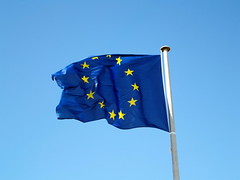More about Scotland and the EU
A few days ago I blogged about Scotland and the EU. At the time I wasn’t aware of a rather important document that had just been published by the UK parliament.
This document is a written statement about “the foreign policy implications of and for a separate Scotland” by Graham Avery, Senior Member of St. Antony’s College, Oxford University, Senior Adviser at the European Policy Centre, Brussels, and Honorary Director-General of the European Commission. In other words, this is probably the greatest authority that has ever published an opinion on this crucial question.
Here is what he has to say about the question about Scotland’s continued EU membership:
For practical and political reasons the idea of Scotland leaving the EU, and subsequently applying to join it, is not feasible. From the practical point of view, it would require complicated temporary arrangements for a new relationship between the EU (including the rest of the UK) and Scotland (outside the EU) including the possibility of controls at the frontier with England. Neither the EU (including the rest of the UK.) nor Scotland would have an interest in creating such an anomaly. From the political point of view, Scotland has been in the EU for 40 years; and its people have acquired rights as European citizens. If they wish to remain in the EU, they could hardly be asked to leave and then reapply for membership in the same way as the people of a non-member country such as Turkey.
It’s definitely worth reading the entire document.
Needless to say, this document has ignited the Scottish blogosphere. See for instance Wings Over Scotland, Bella Caledonia and Auld Acquaintance.

I think it’s fascinating to read your points about Scotland and the “liberation”, thoug it’s so strange to me. I used to live in Denmark, now in the Netherlands. I’ e be er had a strong feeling of netionality. Now, I live split beteeen Russia and the Netherlands. My sense of nationalitet is decreasing even more. My sidstningen is why? Why should I care about nationality? To me it’s been more of a hindrance. I’d rather we al became one instead of separate countries. Of course we’re not all the same, but most are pretty similar, and emphasizing diffeenses instead of similarities is not necessarily a good way to go. I’m not saying Scotland should work for a stronger UK, but why not work for a stronger EU, NATO, UN or what have you?
It’s an interesting question you’re asking, Michael. To a very large extent, I agree with you — I’m an internationalist, not a nationalist in the traditional sense of the word.
However, the UK is in many ways a very nationalistic and centralised country (still bemoaning the loss of empire, and being run to a very large extent by the City of London), and this British nationalism is making it hard to be an internationalist in Scotland without requiring a Scottish state. Discussing the EU or NATO in Scotland is kind of pointless at the moment, because the decisions that affect us are being taken by Londoners based on their needs, not ours.
Pingback: The Swiss capital of the European country | Arc of Prosperity